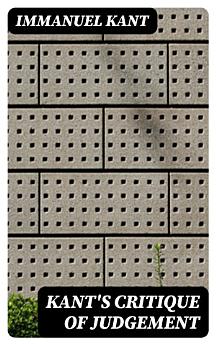Kant's Critique of Judgement
Immanuel Kant
Aug 2022 · DigiCat
Ebook
348
Pages
family_home
Eligible
info
reportRatings and reviews aren’t verified Learn More
About this ebook
Immanuel Kant's "Critique of Judgement" represents a pivotal exploration of aesthetics and teleology, forming a crucial part of his critical philosophy. This work, written in 1790, bridges the gap between the empirical inquiries of the "Critique of Pure Reason" and the moral imperatives of the "Critique of Practical Reason." Kant employs a meticulous analytical style, melding metaphysical inquiry with a profound examination of human experience, particularly in regard to beauty and sublime. He seeks to articulate the principles underlying aesthetic judgments and the experience of nature, asserting the significance of subjective feelings in the comprehension of universal concepts. Kant, a central figure in modern philosophy, draws on his background in metaphysics and epistemology to craft this text. Living in the Enlightenment era, Kant's engagement with the prevalent ideas around human understanding and moral philosophy profoundly influenced his treatment of aesthetic judgment, posing significant questions about the role of the viewer and the object of beauty. His rigorous intellectual upbringing in Königsberg, alongside his discussions with contemporaries, crystallized his belief in the interrelation of aesthetic experience and rational thought. For scholars, students, and lovers of philosophy alike, "Critique of Judgement" offers essential insights into the complexities of human perception and the foundations of aesthetic appreciation. Kant's contemplative approach urges readers to reconsider not only the nature of beauty but also the implications of their own judgments within a broader philosophical context. It is a compelling read for anyone seeking to understand the intricate balance between subjective experience and objective principles.
About the author
Immanuel Kant was an 18th-century philosopher whose work has had a profound impact on modern Western thought. Born on April 22, 1724, in Königsberg, Prussia (now Kaliningrad, Russia), Kant's comprehensive and systematic works in epistemology, ethics, and aesthetics have been pivotal to the development of contemporary philosophy. His critical philosophy, particularly the 'Critique of Pure Reason,' examines the limits of human knowledge and the conditions of possibility for any experience at all. The profundity of his ideas, which seek to reconcile rationalism and empiricism, provided a framework for the German Enlightenment and influenced philosophy to this day. The 'Critique of Judgement,' also known as 'Kritik der Urteilskraft,' expands on his earlier works and delves into aesthetics and teleology. In it, he discusses the ability to judge beauty and purposefulness as a part of his broader discussion on the faculty of judgement. This work, like his others, is distinguished by his impeccable arguments and dense, meticulous prose. Kant's deontological ethical system, articulated in 'Groundwork of the Metaphysics of Morals,' remains hugely influential, introducing the 'Categorical Imperative' as a principal guide to moral behavior. Even two centuries after his death on February 12, 1804, Kant's vast contributions continue to resonate, with his ideas still at the center of philosophical debates and discussions.
Rate this ebook
Tell us what you think.
Reading information
Smartphones and tablets
Install the Google Play Books app for Android and iPad/iPhone. It syncs automatically with your account and allows you to read online or offline wherever you are.
Laptops and computers
You can listen to audiobooks purchased on Google Play using your computer's web browser.
eReaders and other devices
To read on e-ink devices like Kobo eReaders, you'll need to download a file and transfer it to your device. Follow the detailed Help Center instructions to transfer the files to supported eReaders.








